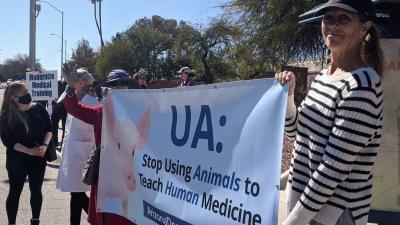With Visual Display, Doctors, Lawmakers, and Locals Denounce Wayne State’s Dog Experiments
Event Highlights 136 Dogs Killed Since 2009

DETROIT—With a visual display stretching 200 feet outside the Wayne State University School of Medicine, supporters of the Physicians Committee for Responsible Medicine and state lawmakers gathered today to urge the institution to end its use of dogs in deadly heart failure experiments. Sen. Dayna Polehanki, D-Livonia, and Rep. Matt Koleszar, D-Plymouth, stood alongside 136 dog beds, each topped with a collar and nametag of a dog who has died at Wayne State since 2009. Details on the dogs, including the date each was killed, were obtained through Freedom of Information Act requests. It is unclear how many dogs in total have died in the experiments since they began in 1991. The demonstration took place outside the Louis M. Elliman Building, where many of the experiments have been conducted.
According to public records, Wayne State staff surgically open the chest cavities and sides of healthy dogs, implant medical devices and catheters in and around major arteries, and “tunnel” cables and wires under the animals’ skin and out through incisions between their shoulder blades. Many dogs die soon after the surgeries due to internal bleeding caused by implanted devices. Every dog who survives the initial surgeries will die during the experiment, in which a device triggers the animals’ hearts to beat at two to three times the normal rate while they run on treadmills. This is by design as Wayne State experimenters use each dog until his or her body gives out or a device breaks or malfunctions. Despite conducting the experiments for 31 years, Wayne State has been unable to point to a single improvement in patient health that has stemmed from them.
Dr. Jennifer Giordano and nurse practitioner Caroline Trapp, both of Farmington Hills, represented the Physicians Committee during the event alongside dozens of locals. Dr. Giordano also started an online petition to the National Institutes of Health (NIH), which asks the agency to stop funding the experiments and has collected 12,500 names as of today. Each year around the end of March, the NIH gives Wayne State more funding for these experiments. Critics of the experiments, including Dr. Giordano and the legislators, note that the $15 million funneled to the experiments by the NIH have not resulted in any improvements in heart disease treatment or prevention, recommending that funding instead go to human-relevant research, such as population studies like the Framingham Heart Study, cell-based methods, and the use of diseased hearts from patients undergoing transplants.
“Heart disease is the leading cause of death in Michigan and across the nation, which is why we need research that benefits patients,” said Dr. Giordano. “With its cruel dog experiments, Wayne State is wasting precious time and money.”
To interview Dr. Giordano or to see the petition to the NIH, please contact Reina Pohl at 202-527-7326 or rpohl [at] pcrm.org (rpohl[at]pcrm[dot]org).
Media Contact
Reina Pohl, MPH
202-527-7326
rpohl[at]pcrm.org
Founded in 1985, the Physicians Committee for Responsible Medicine is a nonprofit organization that promotes preventive medicine, conducts clinical research, and encourages higher standards for ethics and effectiveness in education and research.








